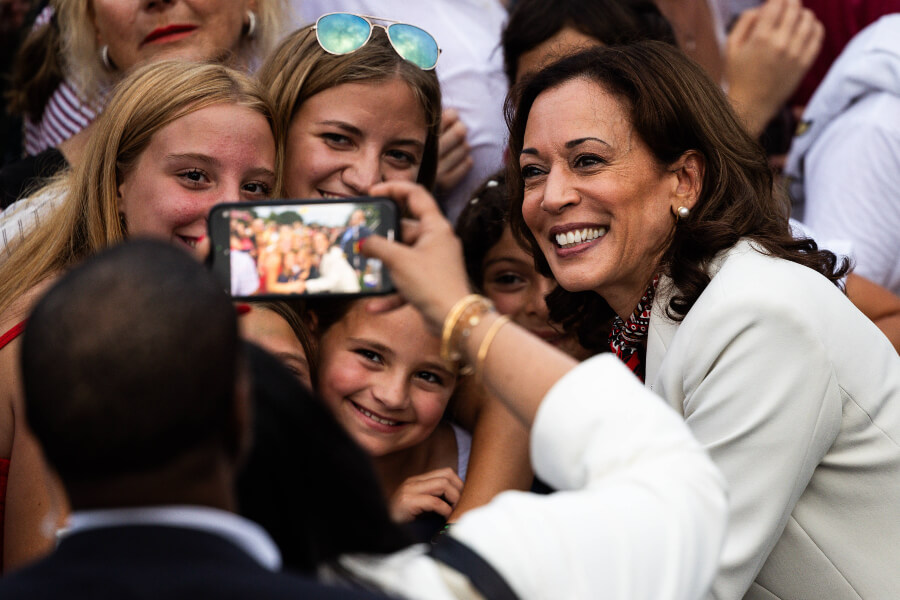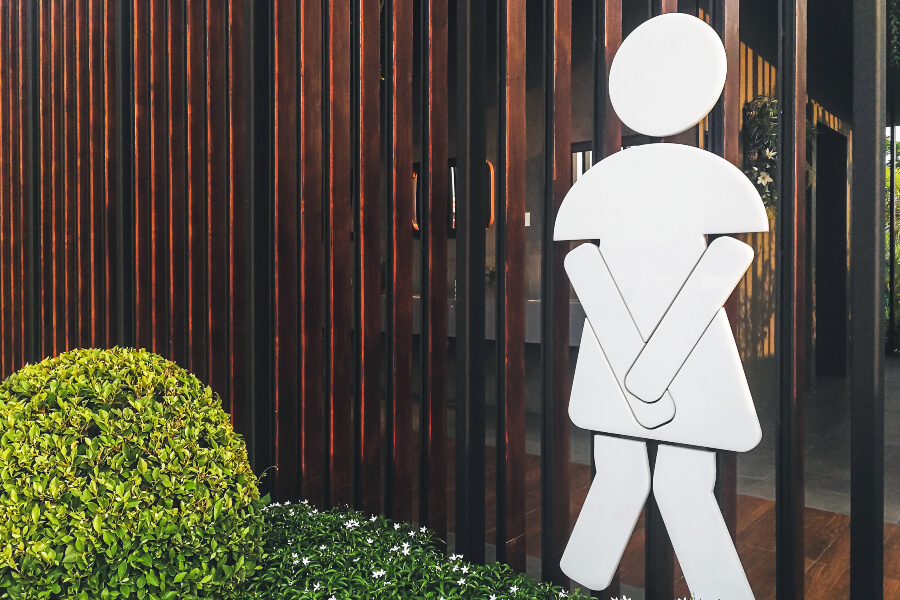Those of us who would like to see a woman elected President of the United States may be feeling pretty optimistic right now. After all, a remarkable 85 percent of state convention delegations immediately declared support for Vice President Kamala Harris as the Democratic nominee after President Joe Biden exited the race, and her campaign raised a whopping $200 million in its first week.
That’s a lot of support for the presumptive candidate’s “path to victory.” Yet those strongly in favor of putting a female in the Oval Office (only 18 percent of U.S. adults, according to the Pew Research Center) have been disappointed before, when Hillary Clinton lost to Donald Trump in 2016. The data from Pew, compiled from two separate national polls, was released in September 2023—and at that time, only one in four Americans considered it very likely that this country would elect a woman president in their lifetime.
Of course, that research was purely hypothetical, conducted before the historic events in which we’re currently immersed. And now, it seems, the signals just may be indicating that we’re ready for the ultimate lady boss—not merely in theory but in reality. Here’s why this sea change is happening—and what it means to the candidacy of Kamala Harris. So could the U.S. elect a first female President? Read on!
Taking a Look at Ladies Who Lead
Since no man—or woman—is an island, let’s first look at female leaders globally. In 26 countries around the world, women currently serve as heads of state or government, and that number will increase by one in October, when Claudia Sheinbaum, Mexico’s first female president elect, is set to take office. What’s more, according to the Women’s Power Index, 13 countries are at least 50 percent female in terms of their national cabinet, and six have at least 50 percent women in the national legislature.
Closer to home, women make up 28 percent of the 118th United States Congress, the highest percentage in our country’s history. There are a record 128 women in the House of Representatives and 25 women serving in the Senate. These include Vermont’s Becca Balint, the first woman and openly LGBTQ person elected to Congress from the state, and Katie Britt, the first female U.S. Senator from Alabama.
It’s not just the political sphere that’s seeing women on the rise. Greater numbers of women are running companies these days, reaching a major milestone in 2023 according to Forbes, with women at the helm of 10 percent of Fortune 500 companies (nowhere near the number it should be, but still, it does represent progress). They’re not mere figureheads put in place to meet quotas—these women are making strides and achieving impressive results.
Take Mary Barra, CEO of General Motors. Profitability and sustainability go hand in hand for Barra, who’s leading the automotive giant toward high-profile innovations and investments. She spearheaded development of the Chevrolet Bolt EV (the first affordable electric vehicle with a range of more than 200 miles) and committed the company to invest an impressive $20 billion in electric and autonomous vehicle technology by 2025.
Women of color are also ascending in business, with Thasunda Brown Duckett, the CEO of financial organization TIAA (Teachers Insurance and Annuity Association), a prime example. Duckett, who made the Time Most Influential People list in 2024, is dedicated to helping the 40 percent of Americans at risk of running out of retirement savings, a goal that speaks to the way women lead—with compassion, collaboration, and empathy.
What a Woman Can Bring to the Presidency
Turning back to the topic of politics, according to the Pew research, 64 percent of Americans believe that the president’s gender doesn’t matter very much. That’s a good thing—we should vote for the best possible person. However, as Melinda French Gates told Time, “There is evidence that women govern differently, working more collaboratively across party lines and introducing legislation on issues that have historically gone unaddressed.”
Large numbers of Pew poll respondents echo philanthropist Gates, contradicting other studies. They say they think a woman president would be better than a man at working out compromises, being honest and ethical, standing up for her beliefs despite political pressure, and working well under pressure.
So how come America has lagged behind such developed countries as Australia (Prime Minister Julia Gillard served between 2010 to 2013), Germany (Chancellor Angela Merkel served from 2005 to 2021), and Denmark (current Prime Minister Mette Frederiksen has served since 2019)? Pew found that Americans perceive various reasons for the shortage of women in high political offices, including having to do more to prove themselves than men (54%), gender discrimination (47%), getting less support from party leaders (47%), and family responsibilities (44%).
As Jamie Van Horne Robinson, founder of Electing Women Seattle, shared in Forbes: “We know women leaders are grounded in the issues that matter most to American families, such as economic opportunity, education, health care, and safety. In this time of extreme division and uncertainty, there’s never been a more important moment for Americans to boldly choose a leader who will rally us together around a common goal, reinvigorate the American spirit, and steward policy decisions we desperately need to build the foundation for the next generation.”
What Kamala Harris Can Bring to the Presidency
So is Kamala Harris that person, that leader…that President?
These last four years, Harris has been busy pursuing an agenda shared with President Biden. Yet if it feels like she hasn’t been in our face much (veeps typically operate behind the scenes), glance back to the former U.S. Senator from California rigorously questioning Jeff Sessions (2017), Brett Kavanaugh (2018), and William Barr (2019). Anyone wondering if Harris can hold her own with the “big boys” will have little doubt that she can, does, and will. There’s a reason these videos went viral—and they ought to whet our collective appetite to watch Harris debate Trump and see her skills on the main stage.
Right now, Harris is stumping—inspiring crowds with speeches full of promise. Here, in a nutshell is where she stands on four crucial issues, so you can judge for yourself if you think she should be our next POTUS.
- Health Care: Harris is a fierce longtime champion of reproductive rights, one example being last year’s Reproductive Freedoms Tour, when she became the first Vice President to visit an abortion clinic while it office. (No President has done that.) During her 2020 presidential campaign, she proposed transitioning to a Medicare-for-All-type system without raising taxes on the middle class.
- Climate Change: Harris has a 90 percent lifetime score from the League of Conservation Voters (which tracks lawmakers’ voting records on energy and environmental issues). She sued Big Oil during her tenure as California’s attorney general and sponsored the Green New Deal during her 2020 presidential run. Her administration would need to quickly decide on a plan to reduce U.S. climate pollution by 2035 as required by the Paris Agreement.
- Economy/Debt: As a 2020 presidential candidate, Harris proposed a refundable tax credit of up to $6,000 a year to help working and middle class families keep up with living expenses. She also advocated raising the corporate income tax rate to 35 percent. She supports the current administration’s initiatives on forgiving student debt. In addition, she has stated her commitment to “creating a future where every person has the opportunity to build wealth and thrive.”
- Ukraine/Israel-Gaza: The conflicts in these regions are at the top of U.S. foreign policy issues. Harris remains committed to helping Ukraine’s fight against Russia, having met several times with Ukrainian President Volodymyr Zelensky and proposed $1.5 billion for energy assistance, humanitarian needs, and other aid for the war-torn country. Though she claims complete support for Israel, Harris speaks from the heart on the horrific situation in Gaza: “We cannot look away in the face of these tragedies. We cannot allow ourselves to become numb to the suffering. And I will not be silent.”
Could the U.S. Elect a First Female President?
Now, it’s up to you. Does the idea of a female President sound good? And does Vice President Harris herself sound like the right person for the job? Think about it, and come November, you know what to do.





















0 Comments